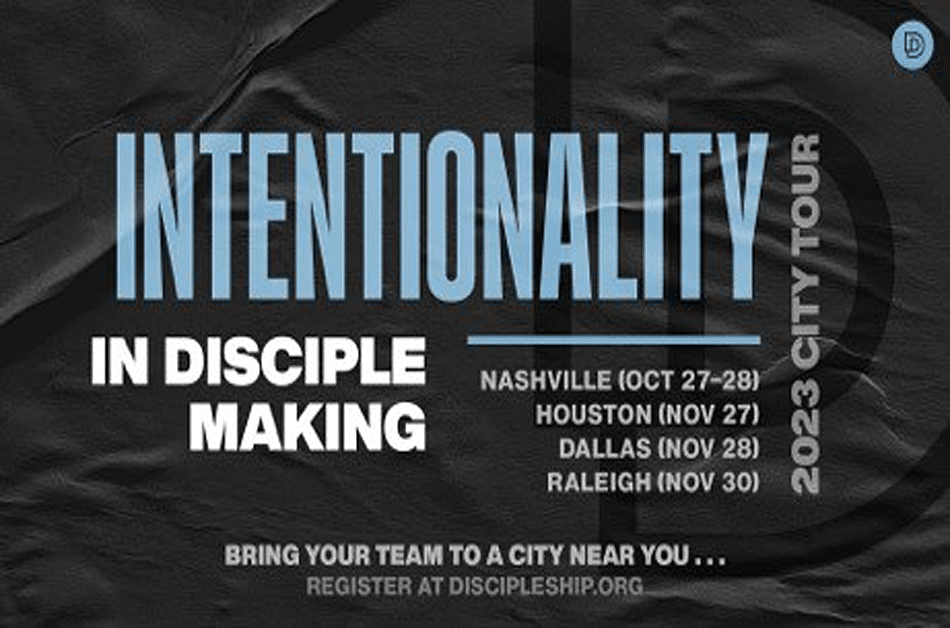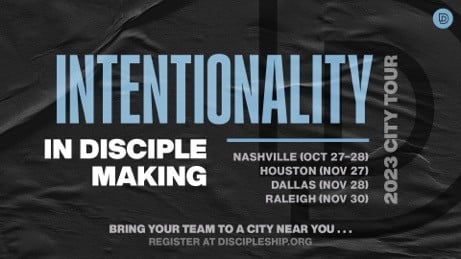Intentionality in Disciple Making

Intentionality is the single most strategic area of disciple making. It is the difference between just wanting to help people and actually making disciples. We like the way the Oxford Dictionary defines intentionality – the fact of being deliberate or purposive. As a philosophy, it is the quality of mental states (e.g., thoughts, beliefs, desires, hopes) that consists in their being directed toward some object or state of affairs. Stated succinctly, disciple making is directed toward helping people to come to faith in Jesus and to form their lives around Jesus Christ.
Curt Erskine is on the Discipleship.org leadership team. Read how he describes his own introduction to disciple making…
My introduction to Jesus Style Disciple Making was when I took an elective class on discipleship in seminary. In that class, one of the first books that I read was the book, Discipleshift: Five Shifts to Help Your Church Make Disciples Who Make Disciples (by Bobby Harrington and Jim Putman). As I read Discipleshift, I sat in my living room and alternated between crying from broken heartedness over the condition of our churches, and laughing for joy over having finally found what I believed to be the answer for the condition of our churches.
I then read quite a few different discipleship books including some from Jim Putman and Brandon Guindon from Real Life Ministries and the Relational Discipleship Network. After doing so, I thought to myself, “These guys have a plan.” Everyone else spelled out what it meant to be a disciple of Jesus, but the guys at Real Life and the RDN laid out what I believed was the best step-by-step, intentional plan for how to be and make disciples of Jesus. However, my next thought was, “Well, anyone could write about this stuff, I wonder if they really do it.”
To be honest, by this point in my life I was extremely skeptical of anything that churches and pastors said (even though I was a pastor). I had been disappointed far too many times. So, my wife and I jumped on a plane and attended a Discipleshift conference at Jim and Brandon’s church in Idaho to see if what they were proposing was possible.
On the first day of the Discipleshift conference they feed you breakfast. During breakfast, the two leaders who would be with us in our small group sat down at our table and ate breakfast with us. I thought to myself, “We paid a decent amount of money to be here, I guess the least they can do is come and sit with us.”
I told you I was skeptical.
I had seen too many things in churches in my life that had turned out to be fake, so my assumption was that their interest in us was fake as well. However, what I assumed was fake interest was actually intentionality. They sat with us not because we paid them too, but because they were intentionally getting to know us so that they could help us be and make disciples of Jesus.
This intentionality was probably one of the first things that drew me to Jim and Brandon and their plan of disciple making. In fact, one of the biggest things that had turned me off from churches in our American culture was the lack of intentionality. In my opinion, if you are going to do something, have a plan and do it. If it doesn’t work, come up with a better plan and try again. If you are going to be and make disciples of Jesus, have a plan and make sure that it works.
By the end of the conference, I was more than convinced that what the guys at Real Life were proposing about being and making disciples of Jesus was not only possible, but that they were actually doing it, intentionally, every day. But most importantly, I was convinced that what they were proposing about being and making disciples was how Jesus made disciples; intentionally.
One of the things that ultimately convinced me about the intentional approach was when we attended a Thursday night service at Real Life Ministries in Post Falls and someone was in the parking lot intentionally shaking people’s hands as they came into the building… that someone was Jim. When we left the service, someone was at the door of the building intentionally shaking hands… Jim. I have visited much smaller churches where the pastor couldn’t be bothered to get to know people, much less visitors.
If my wife would have had her way, we would have packed up and moved to Idaho to become members of Real Life. It wasn’t just because Jim and Brandon were intentional, but because they had taught their church to be intentional. I imagine that if we had packed up and moved to Idaho and joined Real Life, it might not have been Jim or Brandon that we would have gotten to know, but that there were plenty of other people in the church who would have intentionally gotten to know us and helped us to be and make disciples of Jesus.
Ultimately, that is what I believe that many people who really want to be and make disciples of Jesus are looking for, even if they don’t know what to call it; someone to intentionally form a relationship with them and intentionally teach them how to be and make disciples of Jesus. That’s what I was looking for, and I thank the guys at Real Life for helping me find it.
Fast forward 10 years and I am now working with Brandon and the church that he planted in Houston, Real Life Texas, to plant a Real Life Ministries in western North Carolina. As I have gotten to know Brandon (and Bobby and Jim), I can tell you that they are every bit as intentional as I first thought they were (if not more). This intentionality is one of the main things we are missing in our churches.
Let’s close with one summary reminder for you to take away: disciple making is intentionally helping people to come to faith in Jesus and to form their lives around Jesus. It’s the greatest thing to be intentional about on planet earth.
Because of the importance of intentionality in disciple making, we at Discipleship.org are going to emphasize this skill set and mindset over the next four months.
Please join with us and seek to share understanding, insight, and practical tools so that you can become skilled at intentionality in relational disciple making and you can help those on your team or in your leadership group to do the same.
There are four ways in which we are emphasizing intentionality to help you in the next four months.
- Discipleship.org City Tour Forums – our four City Tour Forums are designed to help you and your team both understand and develop an intentionality posture. The tour is comprised of one day, high impact forums where there will be teaching and round table discussions. Every attendee also gets a copy of Brandon Guindon’s new book, Intentional: Living Out the Eight Principles of Disciple Making.
Click the image below for more information.

Take the FREE Individual Disciple Maker Assessment – we designed this assessment with a team of national and international disciple making leaders to help each individual be able to evaluate their disciple making mindset and skill. Just by taking this assessment, you will gain an appreciation for the value of intentionality, along with a sense of how you can increase your own level of intentionality.
Click the image below to take the assessment.

- Read the short FREE book, Becoming a Disciple Maker: The Pursuit of Level Five Disciple Making – Bobby wrote this short eBook with statistician Greg Wiens to help you understand the mathematical and practical impact of one person’s disciple making efforts and skills.
Click the image below to download this free eBook.

- Read Brandon Guindon’s book, Intentional: Living Out the Eight Principles of Disciple Making – Brandon wrote this Discipleship.org book and Zondervan is publishing, because the understanding and practice of disciple making is so crucial. Every attendee at each of our City Tour events (Nashville, Houston, Dallas and Raleigh), as mentioned above, will receive a FREE copy of Brandon Guindon’s book.
Click the image below to pre-order Brandon Guindon’s book from Amazon.com.
Please join with us in this quest to better understand and practice intentionality. It will help us all to become more and more like Jesus, the world greatest disciple maker.

If you have enjoyed reading this, please consider joining our email list!











